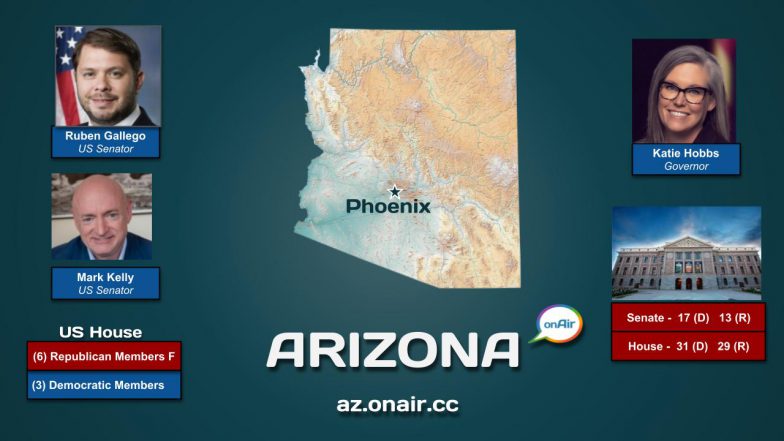Summary
Arizona, a southwestern U.S. state, is best known for the Grand Canyon, the mile-deep chasm carved by the Colorado River. Flagstaff, a ponderosa pine–covered mountain town, is a major gateway to the Grand Canyon. Other natural sites include Saguaro National Park, protecting cactus-filled Sonoran Desert landscape. Tucson is University of Arizona territory and home to the Arizona-Sonora Desert Museum.
The government of Arizona consists of the executive, judiciary, and legislature of Arizona as established by the Arizona Constitution. The executive is composed of the Governor, several other statewide elected officials, and the Governor’s cabinet. The Arizona Legislature consists of the House of Representatives and Senate. The judiciary is composed of the Arizona Supreme Court and lower courts. There is also local government, consisting of counties, municipalities and special districts.
OnAir Post: Arizona onAir
News
The base content in each post in this Arizona onAir Hub has been updated as of 12/20/23. In addition to the eight posts on the home page, in depth posts on each US House member and posts on Arizona government and elections have been started. These posts have been shared with the US onAir Hub and will updated in the US onAir automatically when they are updated in this hub.
If your university or nonpartisan organization (such as a government focused research center, citizen engagement program or a League of Women Voters chapter) is interested in assisting the US onAir network to help curate new issue posts or other posts on this Hub and moderate the forums in each post, contact Ben Murphy at Ben.Murphy@onair.cc.
We are also supporting college students to start an onAir chapter on the their campus to coordinate the curation and moderation of posts especially on state and local representatives and government.
About
The Arizona onAir Hub supports Arizonans to become more informed about and engaged in local, state, and federal politics while facilitating more civil and positive discussions with their representatives, candidates, and fellow citizens.
- Arizona onAir is one of 50 state governance and elections hubs that the US onAir Network is providing to help reinvigorate US democracy. This post has short summaries of current state and federal representatives with links to their complete Hub posts. Students curate post content from government, campaign, social media, and public websites. Key content on theArizona Hub is also replicated on the US onAir nations Hub at: us.onair.cc.
- Arizona students will be forming onAir chapters in their colleges and universities to help curate Hub content. As more students participate and more onAir chapters are started, we will expand to include more state and local content as well as increase the number of aircasts – student-led, livestreamed, online discussions with candidates, representatives, and the public.
Find out more about Who Represents Me in Arizona
Learn more about the US onAir Network
All hub content in onAir hubs is free to the public. Hub ontent is under the Creative Commons Attribution-NonCommercial license which permits content sharing and adaptation by nonprofit organizations as long as proper attribution is given to its author(s) and is used for non-commercial purposes. Content and moderation guidelines reinforce our commitment to fact-based, comprehensive content and civil and honest discourse.
To participate in aircast and post discussions, email usdemocracy@onair.cc and include your first name last name, and zipcode. Your real name and any other profile information will not be displayed unless you choose to do so. Your personal information is not shared with any other website or organization.
Hub membership will enable you to:
- Participate in issue and interview aircasts (student-led livestreamed discussions);
- Interact directly with post authors and curators giving them feedback, content suggestions, and asking questions;
- Ask questions, make suggestions, and give endorsement to representatives
Web Links
State Representatives
Governor Katie Hobbs
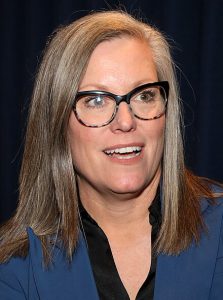 Current Position: Governor since 2023
Current Position: Governor since 2023
Affiliation: Democrat
Former Positions: Attorney General from 2019-2023; State Senator for District 24 from 2013 – 2019; State Delegate from 2011 – 2013
Kathleen Marie Hobbs is an American politician and social worker who is serving as Secretary of State of Arizona since January 2019. A member of the Democratic Party, she was an Arizona state senator representing the 24th district from 2013 to 2019 and an Arizona state representative representing the 15th district from 2011 to 2013.
OnAir Post: Katie Hobbs – AZ
US Representatives
Senator Kristen Sinema
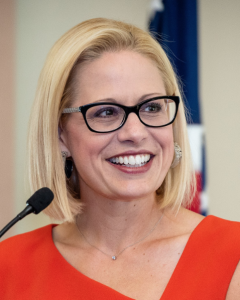 Current Position: US Senator since 2019
Current Position: US Senator since 2019
Affiliation: Democrat
Former Position: US Representative from 2013 – 2019
Upcoming Election:
Quotes:
The Senate passed our Growing Climate Solutions Act to increase economic opportunity for Arizona farmers while creating clearer air and a cleaner environment. @kyrstensinema
OnAir Post: Kyrsten Sinema – AZ
Senator Mark Kelly
 Current Position: US Senator since 2021
Current Position: US Senator since 2021
Affiliation: Democrat
Candidate: 2022 US Senator
Former Position: Astronaut from 1996 – 2011
Quotes:
Modern, robust infrastructure allows communities to thrive and economic opportunity to grow. I’m working with local leaders across Arizona to understand the priorities for each community as we work on a bipartisan infrastructure agreement in the Senate. @CaptMarkKelly
OnAir Post: Mark Kelly – AZ
David Schweikert AZ-01
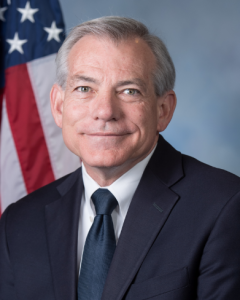 Current Position: US Representative of AZ 1st District since 2011 (formerly 6th)
Current Position: US Representative of AZ 1st District since 2011 (formerly 6th)
Affiliation: Republican
Former Positions: State Delegate from 1991 – 1994; Maricopa County Treasurer from 2004 – 2007
Other positions: Senior House Republican Member, U.S. Congress Joint Economic Committee
District: northeast Phoenix, Scottsdale, Paradise Valley, Cave Creek, Carefree, and Fountain Hills; is majority-white; and is the wealthiest congressional district in Arizona.
Upcoming Election:
Quotes:
Americans are seeing increased costs every day – from grocery to gas, #Bidenflation is hurting hard-working Americans. Yet Democrats are proposing $3.5 trillion in new spending and tax hikes. @RepDavid
OnAir Post: David Schweikert AZ-01
Eli Crane AZ-02
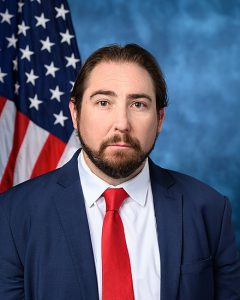 Current Position: US Representative of AZ 2nd District since 2023
Current Position: US Representative of AZ 2nd District since 2023
Affiliation: Republican
District: north eastern part of the state and includes Apache, Coconino, Gila, Navajo, and Yavapai counties in their entirety and portions of Graham, Maricopa, Mohave, and Pinal counties. The largest city in the district is Flagstaff.
Upcoming Election:
Eli Crane served in the United States Navy SEALs and co-founded Bottle Breacher, a company that manufactures bottle openers made of 50-caliber shell casings. In the 2022 House elections, Crane defeated incumbent Democrat Tom O’Halleran.
OnAir Post: Eli Crane AZ-02
Yassamin Ansari AZ-03
 Yassamin Ansari (born April 7, 1992) is an American climate policy activist and politician who served on the Phoenix City Council from 2021 to 2024. At the time of her election, she was the youngest person to be elected to the council and the first Iranian American elected to public office in Arizona.
Yassamin Ansari (born April 7, 1992) is an American climate policy activist and politician who served on the Phoenix City Council from 2021 to 2024. At the time of her election, she was the youngest person to be elected to the council and the first Iranian American elected to public office in Arizona.
OnAir Post: Yassamin Ansari AZ-03
Greg Stanton AZ-04
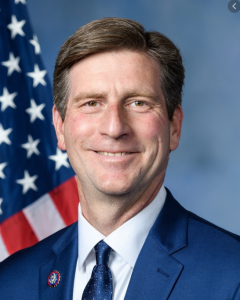 Current Position: US Representative of AZ 04 District since 2019 (formerly 9th district)
Current Position: US Representative of AZ 04 District since 2019 (formerly 9th district)
Affiliation: Democrat
Former Positions: Mayor, Phoenix from 2011 – 2015; Phoenix City Council from 2000 – 2009
District: entirely within Maricopa County.[4]Upcoming Election:
Quotes:
ICYMI: I secured $50 million for the @usbr
to meet their obligations under the Drought Contingency Plan. The importance of a healthy Colorado River to the West cannot be overstated, and these funds will go a long way to conserve water in Lake Mead.
Congressman Greg Stanton of Arizona joined ‘Good Morning Arizona’ Wednesday morning to discuss the inauguration of Joe Biden as the 46th president of the United States and what we can expect in the days, weeks, months, and years to come.
OnAir Post: Greg Stanton AZ-04
Andy Biggs AZ-05
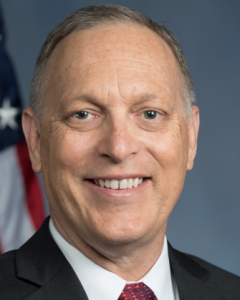 Current Position: US Representative of AZ 5th District since 2017
Current Position: US Representative of AZ 5th District since 2017
Affiliation: Republican
Former Positions: State Delegate from 2003 – 2011; US Senator
District: Gilbert, Queen Creek, southern and eastern Chandler, and eastern Mesa. It is within eastern Maricopa County and northern Pinal County, and includes most of the East Valley.
Upcoming Election
Quotes:
Democrats want to defund the police but spend millions of taxpayer dollars on private security. @RepAndyBiggsAZ
OnAir Post: Andy Biggs AZ-05
Juan Ciscomani AZ-06
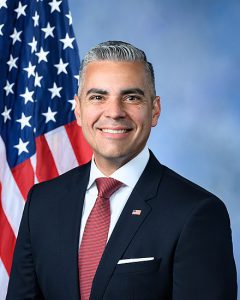 Current Position: US Senator
Current Position: US Senator
Affiliation: Republican
District: all of Greenlee County, most of Cochise County, and parts of Pima County, Pinal County and Graham County. Most of its population resides in suburbs of Tucson, including Oro Valley, Marana, Green Valley, and Vail.
Upcoming Election:
Juan Ciscomani previously worked as a senior adviser to former Governor Doug Ducey, while also serving as vice chair of the Arizona-Mexico Commission. Ciscomani was chosen to deliver the Republican response to the 2023 State of the Union Address in Spanish.
OnAir Post: Juan Ciscomani AZ-06
Raúl Grijalva AZ-07
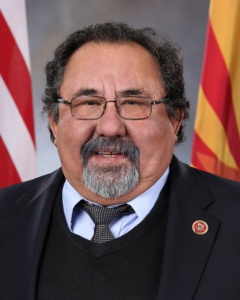 Current Position: US Representative of AZ – 03 since 2003 (formerly 3rd)
Current Position: US Representative of AZ – 03 since 2003 (formerly 3rd)
Affiliation: Democrat
Former Position: Chair, Pima County Board of Supervisors from 1989 – 2002
Other positions: Chair, Committee on Natural Resources
District: The district stretches along the Mexico–United States border and includes the western third of Tucson, parts of Yuma and Nogales, as well as Avondale and Tolleson in Metro Phoenix
Upcoming Election:
Quotes:
I‘ve fought for years to ensure mining companies pay a public royalty, clean up after themselves and treat public resources as a common good. It’s time for mining reform that holds polluters accountable & protects sacred land like the Grand Canyon. Raul M. Grijalva
OnAir Post: Raúl Grijalva AZ-07
Abraham Hamadeh AZ-08
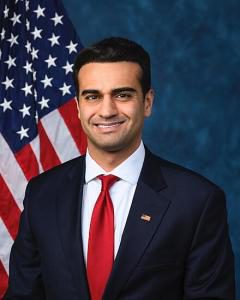 Abraham Jamal Hamadeh[1] (born May 15, 1991) is an American politician, former prosecutor, and U.S. Army intelligence officer, who is the member-elect to the U.S. House of Representatives for Arizona’s 8th congressional district. Hamadeh was previously the Republican Party nominee for Arizona attorney general in the 2022 election.
Abraham Jamal Hamadeh[1] (born May 15, 1991) is an American politician, former prosecutor, and U.S. Army intelligence officer, who is the member-elect to the U.S. House of Representatives for Arizona’s 8th congressional district. Hamadeh was previously the Republican Party nominee for Arizona attorney general in the 2022 election.
OnAir Post: Abraham Hamadeh AZ-08
Paul Gosar AZ-09
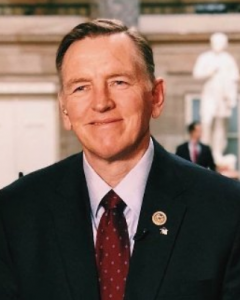 Current Position: US Representative of AZ-09 since 2011 (formerly 4th)
Current Position: US Representative of AZ-09 since 2011 (formerly 4th)
Affiliation: Republican
Other positions: Subcommittee on Oversight and Investigations
District: Western Arizona
Upcoming Election:
Quotes:
I have been working on protecting and enhancing our critical mineral supply chain for several years. Why? Almost every modern convenience is dependent upon these minerals. Items like solar panels and photovoltaic cells, wind power turbines, electric vehicles, drones, fighter jets, radios, electronic shielding, combat equipment, batteries, electronics, and lighting all require critical minerals. Paul Gosar, April 21, 2021
OnAir Post: Paul Gosar AZ-09
More Information
Wikipedia
Contents
The government of Arizona consists of the executive, judiciary, and legislature of Arizona as established by the Arizona Constitution. The executive is composed of the Governor, several other statewide elected officials, and the Governor’s cabinet. The Arizona Legislature consists of the House of Representatives and Senate. The judiciary is composed of the Arizona Supreme Court and lower courts. There is also local government, consisting of counties, municipalities and special districts.
Executive
The statewide elected officers are:
All elected officials hold a term of four years, and are limited to two consecutive terms (except the office of the State Mine Inspector, which is limited to 4 terms[1]). Arizona is one of five states that do not have a specified lieutenant governor, so the Secretary of State is the first in line to succeed the Governor in the event of death, disability, resignation, or removal from office. The line of succession also includes the attorney general, state treasurer, and superintendent of public instruction. Elections for statewide officers occur during even numbered, non-presidential, years, except that 3 of the corporation commissioners are elected during presidential years.
On November 8, 2022, Arizona voters approved a state constitutional amendment (Proposition 131) that created the new position and office of the lieutenant governor beginning with the 2026 elections cycle. The position will be elected on a joint ticket with the governor. The lieutenant governor ascends to the governorship if the incumbent governor dies, resigns, or is removed (via impeachment conviction) from office. The proposition, through a law pre-passed by the state legislature, also tasks the governor with assigning a job to her or his running mate, such as chief of staff, the director of the state Department of Administration, or “any position” to which the governor can appoint someone by law.[2]
Cabinet
The state departments and agencies are:[3]

- Arizona Department of Administration (ADOA)
- Arizona Department of Agriculture (AZDA)
- Arizona Department of Child Safety
- Arizona Department of Commerce
- Arizona Department of Corrections (ADC)
- Arizona Department of Economic Security (DES)
- Arizona Department of Education (ADE)
- Arizona Department of Emergency and Military Affairs (DEMA)
- Arizona Department of Environmental Quality (ADEQ)
- Arizona Department of Fire, Building and Life Safety (DFBLS)
- Arizona State Forestry Division (AZSF)
- Arizona Game and Fish Department (AZGFD)
- Arizona Department of Gaming (ADG)
- Arizona Geological Survey (AZGS)
- Arizona Department of Homeland Security (AZDOHS)
- Arizona Health Care Cost Containment System (AHCCCS)
- Arizona Department of Health Services (ADHS)
- Arizona Department of Housing
- Arizona Department of Insurance and Financial Institutions (AZDIFI)
- Arizona Department of Juvenile Corrections (ADJC)
- Arizona State Land Department
- Arizona Department of Liquor Licenses and Control (DLLC)
- Arizona State Schools for the Deaf and Blind
- Arizona Department of Public Safety (DPS)
- Arizona Department of Real Estate (ADRE)
- Arizona Registrar of Contractors (ROC)
- Arizona Residential Utility Consumer Office (RUCO)
- Arizona Department of Revenue (ADOR)
- Arizona School Facilities Board (SFB)
- Arizona Office of Tourism (AOT)
- Arizona Department of Transportation (ADOT)
- Arizona Department of Veterans’ Services (DVS)
- Arizona Department of Water Resources (ADWR)
- Arizona Department of Weights and Measures (AZDWM). Eliminated in 2015.[4]
- Arizona Boards and Commissions Include
- Arizona Board of Regents
- Arizona Commission for the Deaf and Hard of Hearing
- Arizona Commission of Indian Affairs
- Arizona Historical Society
- Arizona Independent Redistricting Commission
- Arizona Judicial Conduct Commission
- Arizona Power Authority Commission
- Arizona State Boxing Commission
- Arizona State Lottery Commission
- Arizona State Board of Dispensing Opticians
- Arizona State Parks Board
Legislature

The Arizona State Legislature is bicameral and consists of the 60-member Arizona House of Representatives and the 30-member Arizona Senate. Each of the thirty legislative districts has one senator and two representatives. Legislators are elected for two-year terms and are limited to four consecutive terms in a chamber, though there is no limit on the total number of terms.
Each Legislature covers a two-year period. The first session following the general election is known as the first regular session, and the session convening in the second year is known as the second regular session. Each regular session begins on the second Monday in January and adjourns sine die (terminates for the year) no later than Saturday of the week in which the 100th day from the beginning of the regular session falls. The President of the Senate and Speaker of the House, by rule, may extend the session up to seven additional days. Thereafter, the session can only be extended by a majority vote of members present of each house.
Judiciary

The Arizona Supreme Court is the highest court in Arizona. The court currently consists of one chief justice, a vice chief justice, and five (5) associate justices. The supreme court has appellate jurisdiction in death penalty cases, but almost all other appellate cases go through the Arizona Court of Appeals beforehand. The court has original jurisdiction in a few other circumstances, as outlined in the state constitution. The court may also declare laws unconstitutional, but only while seated en banc. The court meets in the Arizona Supreme Court Building at the capitol complex (at the southern end of Wesley Bolin Plaza).
The Arizona Court of Appeals, further divided into two divisions, is the intermediate court in the state.[5] It hears and decides cases in three judge panels.[5] Division One is based in Phoenix, consists of sixteen judges, and has jurisdiction in the Western and Northern regions of the state, along with the greater Phoenix area. Division Two is based in Tucson, consists of six judges, and has jurisdiction over the Southern regions of the state, including the Tucson area.
The Arizona Superior Court is the court of general jurisdiction.[6] The Superior Court also acts as an appellate court for justice and municipal courts.[6]
The Arizona justice courts are nonrecord courts of limited jurisdiction in each county, presided over by a justice of the peace who is elected for a four-year term, that have jurisdiction over civil lawsuits where the amount in dispute is $10,000 or less, landlord and tenant controversies, small claims cases and the full range of civil and criminal traffic offenses, including DUIs, and other types of misdemeanor allegations (e.g. shoplifting, writing bad checks, violating restraining orders).[7][8]
The Arizona municipal courts, also known as city courts or magistrate courts, are nonrecord courts of limited jurisdiction that have criminal jurisdiction over misdemeanor crimes and petty offenses committed in their city or town and share jurisdiction with justice courts over violations of state law committed within their city or town limits, and hear misdemeanor criminal traffic cases such as driving under the influence of alcohol, hit-and-run and reckless driving where no serious injuries occur, and hear civil traffic cases, violations of city ordinances and codes, and issue orders of protection and injunctions prohibiting harassment, and can also issue search warrants.[7][9]
Merit Selection
All justices of the Arizona Supreme Court and all judges of the Arizona Court of Appeals as well as the trial court judges in some counties are selected through a process known as merit selection, a version of the Missouri Plan. The process, approved by voters in 1974 and amended in 1992, is described in Article 6, Section 37 of the Arizona Constitution.[10] As described there in paragraph B, the selection of trial court judges through this process only applies to counties with a population of over 250,000 people, as counted by the most recent US Census. As of 2023, this only applies to Maricopa County, Pima County, and Pinal County. An exception is made in Section 40 for less populous counties that vote to opt in to the process.[11] As of 2023, only Coconino County has done so, back in 2018.[12]
In merit selection, justices and judges are appointed by the governor from a list recommended by a bipartisan commission, and are re-elected (through what is called retention election) after the initial two years following their appointment. Subsequent re-elections occur every six years for the supreme and appellate courts, every four years for superior courts.[13][14]
Local government
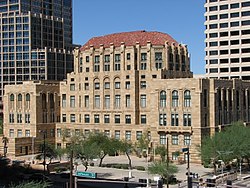
Arizona is divided into political jurisdictions designated as counties, which derive all of their power from the state. Incorporated cities and towns are those that have been granted home rule, possessing a local government in the form of a city or town council.
See also
References
- ^ “Format Document”. www.azleg.gov. Archived from the original on 17 September 2016. Retrieved 8 April 2018.
- ^ Stern, Ray (8 November 2022). “Arizona voters approve Proposition 131 to create lieutenant governor position”. The Arizona Republic. Retrieved 12 November 2023.
- ^ “Department and Agency Heads”. Office of the Governor of Arizona. Retrieved 21 April 2014.
- ^ “Arizona Weights and Measures Department folding, duties moving”. azpbs.org. 2 September 2015. Retrieved 8 April 2018.
- ^ a b “Court of Appeals”. Arizona Administrative Office of the Courts. Retrieved 22 June 2014.
- ^ a b “Superior Court”. Arizona Administrative Office of the Courts. Retrieved 22 June 2014.
- ^ a b “AZ Courts”. Arizona Administrative Office of the Courts. Retrieved 22 June 2014.
- ^ “Justice Courts”. Arizona Administrative Office of the Courts. Retrieved 22 June 2014.
- ^ “City Courts”. Arizona Administrative Office of the Courts. Retrieved 22 June 2014.
- ^ “Judicial Vacancies and Appointments”. Arizona State Legislature. Retrieved 30 November 2023.
- ^ “Option for counties with less than two hundred fifty thousand persons”. Arizona State Legislature. Retrieved 30 November 2023.
- ^ “Voters in Coconino County choose merit selection for judges”. The Associated Press. Retrieved 30 November 2023.
- ^ “Supreme court; term of office”. Arizona State Legislature. Retrieved 30 November 2023.
- ^ “Superior court; term of office”. Arizona State Legislature. Retrieved 30 November 2023.
External links
